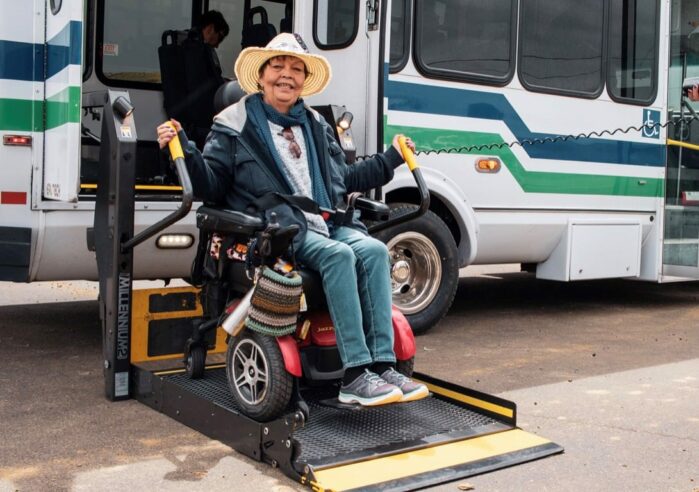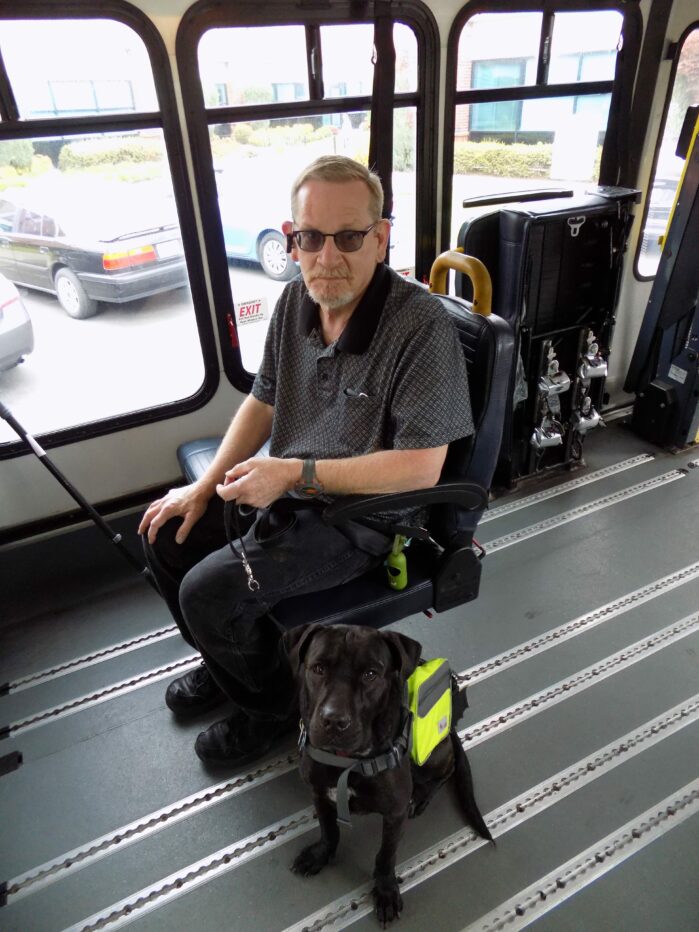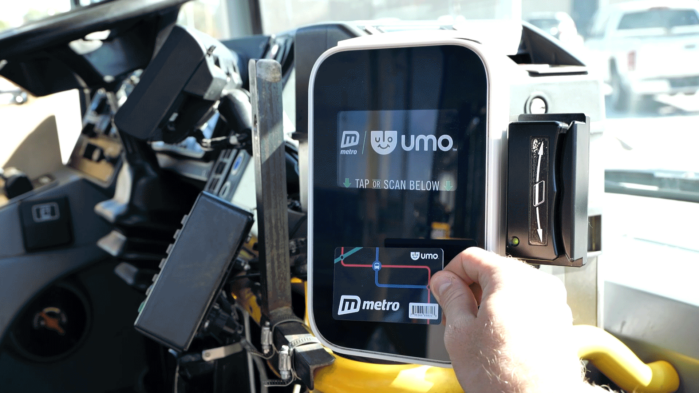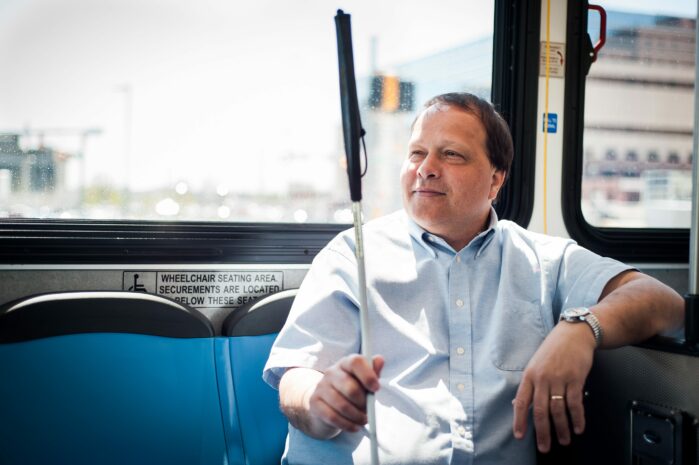Accessibility on Metro

Credit: Capacity Builders, Farmington, NM
Metro is devoted to providing high quality, accessible travel options for all of our customers. All Metro services – bus, ORBT, and MOBY paratransit – are accessible.
Drivers for both bus and MOBY are trained to treat all riders with dignity and respect and to not make assumptions about the level of assistance a rider may need.
Please ask for the help you need.
Wheelchairs + Mobility Devices
Wheelchairs and mobility devices can be used on all Metro and ORBT buses and MOBY vans.
Bus Ramp and MOBY Van Lift Limitations
All fixed-route bus ramps are rated at 1,000 pounds and are at least 30 inches wide.
The weight limit for the lifts on MOBY vans varies by series:
- If a MOBY van number starts with 60, then the lifts are rated at 800 pounds.
- If a MOBY van number starts with 63 or 64, then the lifts are rated at 1,000 pounds.
All MOBY van lift platforms are 34 inches wide and 54 inches long.
If you have questions or concerns about these limitations, please contact Metro’s ADA Coordinator:
- civilrights@ometro.com
- 341.7560 ext. 2550
Securement Process
When you board, the driver will secure your wheelchair/mobility device
Wait until the bus comes to a complete stop before unlocking your brakes
Once you’re at your stop, the driver will unhook the straps and deploy the ramp so that you can exit the bus safely
Requesting a Stop
On the bus, you can request your stop using your stop request button on the folded-up bus seats
If needed, you can also let your driver know where you’ll need to get off the bus when they secure your wheelchair/mobility device
Animals on Board

Credit: Human Services Council of Southwest Washington, Vancouver, WA
Service Animals
The Federal Transit Administration provides the following definition of a service animal:
- Any guide dog, signal dog, or other animal individually trained to work or perform tasks for an individual with a disability, including, but not limited to, guiding individuals with impaired vision, alerting individuals with impaired hearing to intruders or sounds, providing minimal protection or rescue work, pulling a wheelchair, or fetching dropped items.
- An emotional support animal or comfort or therapy animal does not meet the definition of a service animal.
- Service animals must be under the individual’s control for the duration of the ride and must be harnessed, leashed, or tethered, unless the individual’s disability prevents using these devices or these devices interfere with the service animal’s safe, effective performance of tasks. In that case, the individual must maintain control of the animal through voice, signal, or other effective controls.
- Bus or MOBY drivers, or other Metro staff, will not take control of any animal, including a service animal. Caring for a service animal is the responsibility of the rider or a Personal Care Attendant (PCA).
- Metro may refuse to transport service animals that are deemed to pose a direct threat to the health or safety of drivers or other riders, create a seriously disruptive atmosphere, or are otherwise not under the rider’s control. For example, a rider with a service dog is responsible for ensuring the dog does not bite the driver or other riders. Conversely, a dog that barks occasionally would likely not be considered out of the owner’s control.
Other animals
- All animals that do not meet the above definition of a service animal must be in an enclosed carrier while on Metro vehicles.
- The carrier should be placed on the floor or in the rider’s lap, not on a seat, and should not block the aisle or any exits.
- The animal should remain in the carrier and under the individual’s control for the duration of the ride.
Respirators, concentrators, and portable oxygen
- Medical equipment like respirators, concentrators, and portable oxygen are allowed on board.
- Riders are asked to hold the equipment and keep the items out of the aisle.
- Medical equipment is required to be secured on MOBY vans but not on buses.
Riding the Bus
All Metro buses and ORBT vehicles are fully accessible. Learn the basics of riding below!
Boarding the Bus
- As the bus approaches, make sure to signal the driver.
- When the bus doors open, a recording will play to identify which route you are boarding.
- If you need the bus to kneel or need the ramp, ask the driver when the door opens.
- If you are using a wheelchair or mobility device, the driver will secure your device toward the front of the bus. Devices are required to be secured for safety purposes.
Riding the Bus
- Priority seating is available at the front of the bus for riders with disabilities and older adults (65+).
- While on the bus, onboard announcements will play to help you find your way.
- When the bus is nearing your stop, signal the driver with the stop request button or pull cord. The location and style of the stop request signal may vary by vehicle and location within the vehicle.
- If you are a rider with a disability, you can let your driver know where you’ll need to get off the bus when they secure your wheelchair/mobility device and/or ask them to announce any stop you need.
Exiting the Bus
- If you are using a wheelchair or mobility device, the driver will release the securements.
- If you need the bus to kneel or need the ramp to exit, ask the driver.
Driver Assistance
- All bus drivers will, upon request, lower the ramp, kneel the bus, assist a person on and off the vehicle, secure wheelchairs, and help passengers with transfers and route information.
- Metro bus drivers cannot provide assistance to riders after exiting the vehicle.
Mobile Apps
Umo
- The Umo app is designed to allow riders to pay their fare on any of Metro’s services (bus and MOBY). Bus trips, but not MOBY trips, can also be planned in the Umo app.
- Umo was designed with accessibility in mind. Screen readers have full visibility of the App for VoiceOver or TalkBack, and the app is available in 40 languages.
- Check out the Umo user site here.
- You can set next-stop alerts in Umo for your trip so that you never miss your stop. Get more information about Umo’s Next Stop Alerts here.
Download Umo from the App Store Download Umo from Google Play
MyRide OMA
- MyRide OMA gives Metro riders real-time bus tracking information from their mobile device or desktop.
- MyRide OMA has text capabilities, allowing riders to text their route and stop ID number to 531-200-7005 to get real-time departure times for any stop.
- Check out the MyRide OMA website here.
- Learn more about the capabilities of MyRide OMA here.
- MyRide websites are accessible based on aXe v2.4 Accessibility compliance test and the default website color theme meets the WCAG 2.0 AA requirement.
Note: MyRide OMA is only compatible with Metro bus service, not MOBY paratransit service.
Download MyRide OMA from the App Store Download MyRide OMA from Google Play
Fare Payments
 Half-fare program
Half-fare program
- Half-fares are available for eligible riders (individuals with disabilities, individuals aged 62-64 years with Social Security or civil service pension, individuals aged 65 or older, and Medicare card holders).
- Applications on basis of age or Medicare cardholder status:
- Print application – this application is set up to be printed and then filled out.
- Digital application – this application is set up to be filled out online and then printed.
- Applications on basis of disability:
- Print application – this application is set up to be printed and then filled out.
- Digital application – this application is set up to be filled out online and then printed.
- Applications on basis of age or Medicare cardholder status:
Payment Options
Riders can pay with:
- Umo smart card
- The Umo app
- Paper tickets
- Cash
Metro has ticket vending machines at all ORBT stations, the North Omaha Transit Center, the Westroads Transit Center, and the MCC South Transit Center.
- All ticket vending machines are equipped with braille, tactile buttons, and audio announcements.
More information about Metro fares is available here.
Learn to Ride
Training Requests
Interested in setting up a training to learn how to ride? Our Communications team is here to help!
Send us an email at outreach@ometro.com and let us know what date and time, how many people you’re expecting, and any details you’d like our team to really focus on.
Reasonable Modification
Metro’s procedure provides that a reasonable modification to Metro’s fixed route and/or ADA complementary paratransit (MOBY) service, will be performed so long as the requested modification does not meet one of the following exceptions:
- if granting the request would fundamentally alter Metro’s services, programs, or activities;
- if granting the request would create a direct threat to the health or safety of others;
- If, without the requested modification, the individual with a disability is able to fully use Metro’s services, programs, or activities for their intended purpose; or
- if granting the request would cause an undue financial and administrative burden.
Riders can access the Reasonable Modification form here.
Feedback

Credit: Indianapolis Public Transportation Corp., Indianapolis, IN
If you have general feedback about Metro’s services, please contact our Customer Service department:
- Call 402.341.0800 VOICE | Call 402.341.0807 TDD
- Fill out our online comment form
- Send an email to info@ometro.com
If you have any feedback or would like to file a complaint concerning accessibility, contact Metro’s ADA Coordinator:
- ADA Coordinator – civilrights@ometro.com
- 341.7560 ext. 2550
For information about reporting discrimination, visit www.ometro.com/civilrights/
—
Metro is not governed by the City of Omaha.
If you have feedback or would like to file a complaint about accessibility related to areas of the City of Omaha’s oversight (e.g., sidewalks), please contact the Mayor’s Hotline at (402) 444-5555 or www.omahahotline.com or email the ADA Coordinator at adacoordinator@cityofomaha.org.